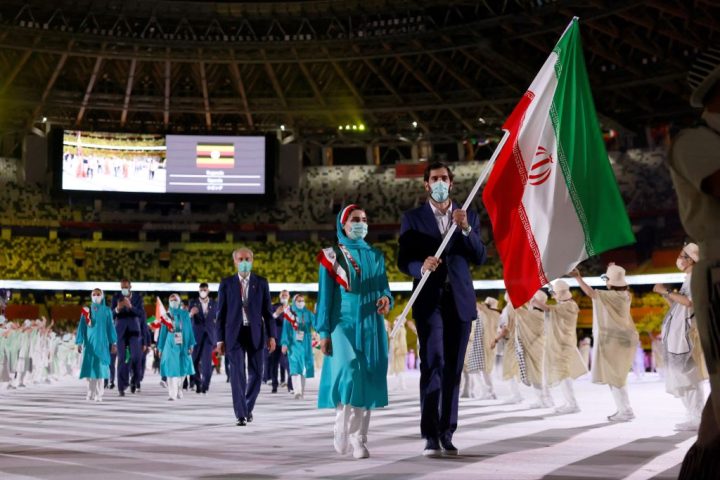Few would disagree with Ben Wallace’s description of Iran as a ‘bully’. The former defence secretary made his comments earlier this week after Iran’s missile attack on Israel. ‘The only option when Iran and Russia hit, I have concluded, is to hit back twice as hard and not stop until they get the message,’ wrote Wallace in the Daily Telegraph.
The UK, along with the US, have since extended sanctions against Iran, as has the EU. ‘We feel it’s very important to do everything to isolate Iran,’ said EU summit chairman Charles Michel.
Even before the missile attack against Israel, there had been another call to ban Iran from the games
Another way to isolate Iran would be to ban their athletes from officially competing in this summer’s Olympics. It has been done to Russia and Belarus (their athletes will be able to compete as neutral competitors in Paris provided they don’t display their national colours) so why not Iran?
Last July, a group of Iranian dissidents wrote to the international Olympic committee (IOC) demanding that Iran be banned because the republic discriminates against women. This discrimination is in breach of the Olympic charter, which states that ‘the practice of sport is a human right’. The IOC barred South Africa from competing in the Olympics from 1970 until 1996 because of its policy of Apartheid.
The IOC replied that they ‘are closely monitoring the situation in Iran’. There has been a lot for the IOC to monitor in the nine months’ since: Iran’s reported involvement in the Hamas attack against Israel on 7 October and the mass missile and drone strike against Israel last weekend. On Thursday, Tehran warned that it may relaunch its nuclear weapons programme in the event that the ‘fake Zionist regime [Israel] threatens to attack our country’s nuclear centres’.
According to British security services, fifteen plots by Iran to kill or kidnap UK-based ‘enemies’ of the regime have been thwarted recently. One that wasn’t, was the stabbing of a dissident journalist in London earlier this month, allegedly by three mercenaries hired by Tehran.
Even before the missile attack against Israel, there had been another call to ban Iran from the games, this one from the US Republican senator Marsha Blackburn. ‘Iran is governed by an evil regime that systematically victimises its own citizens, particularly women and girls, wrote Blackburn to the IOC. ‘Violence permeates every aspect of life for Iranian women.’
There is another way that the West could stand up to Iran: ban the hijab. The Islamic headscarf was alien to western culture before the Iranian Revolution of 1979; indeed, the hijab was not seen very often in Iran before Ayatollah Khomeini deposed the Shah. A month later, on March 7, 1979, to coincide with that year’s International Women’s Day, Khomeini issued a proclamation that the hijab must be worn in the workplace.
The London-based Iranian writer Mansoureh Hosseini Yeganeh, a child at the time, has described how soon ‘more forceful measures began to be implemented regarding compulsory hijab and other issues related to women’s presence in society’.
Within a decade the hijab had spread to Western Europe. In 1989, three girls in Paris turned up to school wearing one, and were promptly sent home. A row erupted that is ongoing; earlier this year a headteacher resigned following receiving death threats after he had told a pupil to remove her headscarf. In the same month, a 13-year-old girl in Montpellier was beaten unconscious by some of her peers because she didn’t wear a headscarf.
Facts like these pass by many of the West’s bien pensants. They regard the wearing of the hijab as liberating, which one suspects isn’t the word young Iranian women would choose to describe a garment that in many cases is a matter of life or death.
Recently, the BBC ran a critical article about the fact that France has forbidden its own Olympians to wear the hijab during the Games. Last year, the IOC said that during the Olympics ‘there are no restrictions on wearing the hijab or any other religious or cultural attire’. Similar tolerance was not extended to football fans when Qatar hosted the 2022 World Cup: beer was banned in the stadiums and women were told to dress modestly. Fans, explained the Qatar Tourism Authority, ‘are expected to show respect for local culture by avoiding excessively revealing clothing in public’.
The BBC didn’t object to that edict, so why it is angry that France has asked its Olympians to respect its laïcité (secularism)? The BBC quoted Veronica Noseda who called the hijab ban Islamophobic and said ‘there is a hate on Muslim people during these last few years in France’. Noseda, who is Swiss, plays for an LGBTQ team in Paris called Les Degommeuses. They have long campaigned for the right to wear the headscarf on the pitch, to the scorn of some in France. The French-Tunisian writer Naëm Bestandji has described Les Degommeuses as the ‘useful idiots of Islamism…they have failed to notice that, while these LGBT people are integrating Islamist sexism into their struggle, political Islamism has never done the same in return’.
The BBC ended its report by quoting a player from Sisterhood FC, a women’s Muslim football club in London. ‘I wouldn’t know how I would feel as a young Muslim person being told by the government that I can’t have the freedom of practising my religion,’ she said. ‘I’m very thankful that my parents didn’t migrate to France.’
She should be more thankful that they didn’t migrate to Iran. This country has spent nearly half a century exporting the worst excesses of Islamic intolerance to the West, and then bullying the Muslim population into dressing the way that Ayatollah Khomeini wanted. It’s time the West put an end to Iranian intimidation and followed France’s example by banning the hijab.







Comments